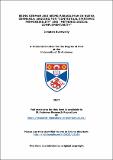Files in this item
Being German and being Paraguayan in Nueva Germania : arguing for “contextual epistemic permissibility and “methodological complementarity”.
Item metadata
| dc.contributor.advisor | Rapport, Nigel | |
| dc.contributor.advisor | Harris, Mark | |
| dc.contributor.author | Kurzwelly, Jonatan | |
| dc.coverage.spatial | 305 p. | en_US |
| dc.date.accessioned | 2017-11-27T16:56:37Z | |
| dc.date.available | 2017-11-27T16:56:37Z | |
| dc.date.issued | 2017-12-20 | |
| dc.identifier.uri | https://hdl.handle.net/10023/12180 | |
| dc.description.abstract | This thesis involves a collaborative study of emic articulations and quotidian ways of ‘being German’ and ‘being Paraguayan’ in Nueva Germania, a rural municipality in Paraguay. An argument is made that the social categories focused upon during this thesis, were evoked according to different contexts. While many claimed that Germanness or Paraguayanness were key categories, essentialistic characteristics that defined them and others as people of a certain kind, in other situations these social divisions were disregarded or even contradicted. This leads me to the theoretical conclusion that social categories, and epistemic frameworks more broadly, should not be understood as universally relevant or as universally applicable, and should not be treated as such. The thesis therefore proposes to assume ‘contextual epistemic permissibility’ as a key axiom for use within anthropology and in the wider social sciences. The possible theoretical and methodological consequences of such an assumption are elaborated upon. Different theories of self, social action, and agency are debated in the course of this thesis: it is asked which might best analytically accommodate the assumption of contextual epistemic permissibility. Furthermore, in order to reflect the multiplicity of emic epistemic frameworks, the thesis proposes that a notion of ‘analytical and representative complementarity’ be introduced, rather than monistic theoretical models. Such complementarity is practised in the thesis through the use of different multiscalar analyses (for example, the use of different theories of nationalism), and through the simultaneous use of different forms of representation. The above theoretical divagations are intertwined and related to the individual stories of twelve people from Nueva Germania, and are presented with both textual and photographic means. The stories were created through a collaborative process. Each project participant was free to decide upon the subject of their account, and therefore the resulting stories are able to cover a variety of different themes, at the same time introducing the reader to individual histories, struggles, opinions, plans, and critiques. Some elements of these accounts directly relate to the theoretical debates focused upon within the thesis while other elements of the individual stories are left to speak for themselves, and for the reader to make sense of independently. The photographs and texts, in their intertextual presentation, allow for an embodiment of the argument concerning representational complementarity. | en_US |
| dc.language.iso | en | en_US |
| dc.publisher | University of St Andrews | |
| dc.subject | Epistemic multiplicity | en_US |
| dc.subject | Identities | en_US |
| dc.subject | Collaborative methods | en_US |
| dc.subject | Participatory photography | en_US |
| dc.subject.lcc | F2699.G3K87 | |
| dc.subject.lcsh | Nueva Germania (Paraguay) | en |
| dc.subject.lcsh | National characteristics, Paraguayan | en |
| dc.subject.lcsh | National characteristics, German | en |
| dc.subject.lcsh | Photography in anthropology | en |
| dc.title | Being German and being Paraguayan in Nueva Germania : arguing for “contextual epistemic permissibility and “methodological complementarity”. | en_US |
| dc.type | Thesis | en_US |
| dc.contributor.sponsor | University of St Andrews | en_US |
| dc.type.qualificationlevel | Doctoral | en_US |
| dc.type.qualificationname | PhD Doctor of Philosophy | en_US |
| dc.publisher.institution | The University of St Andrews | en_US |
This item appears in the following Collection(s)
Items in the St Andrews Research Repository are protected by copyright, with all rights reserved, unless otherwise indicated.

